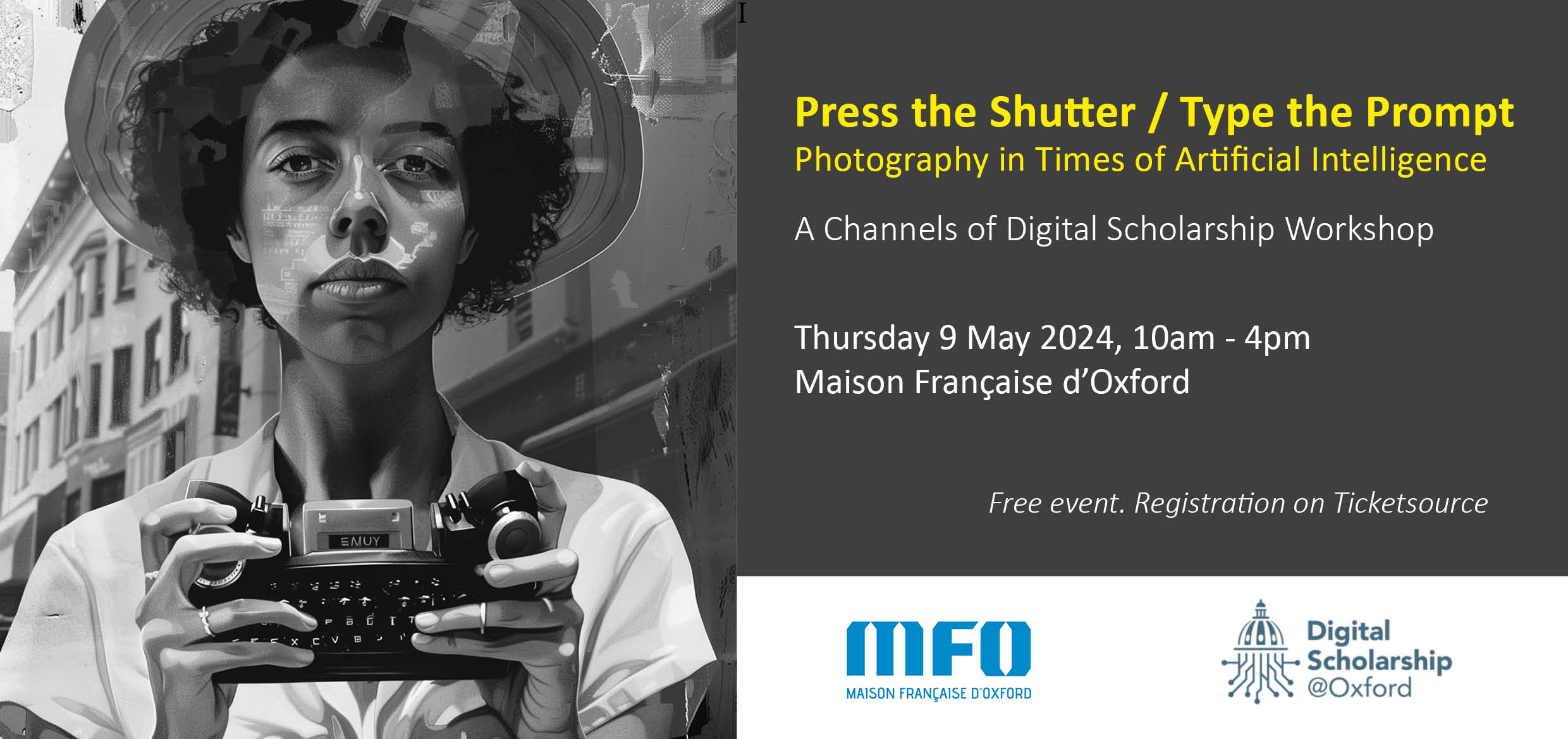
Image: Midjourney
To attend this event, please register here.
Convenors: Goran Gaber (European University Institute/MFO), Andrew Cusworth (Digital Scholarship at Oxford), Anne-Sophie Gabillas (MFO)
PROGRAMME (Available for download here)
From the decisive moment to the eternal flux of prompts: AI and the history of photography – 10am-12pm
Michael Pritchard (Independent Scholar, Consultant, and former Director, the Royal Photographic Society, UK)
Alexandre Portron (Professor in Private Law, Université de Poitiers, France)
Alan Capel (Chief Commercial Officer, SmartFrame Technologies, UK)
Type, Publish, Curate: Opportunities and challenges of image-generating AI – 2-4pm
Michael Christopher Brown (Artist & Photojournalist, USA – Online)
Nicolas Jimenez (Director of Photography, Le Monde, France)
Katy Barron (Director, Photo Oxford, UK)
What does artificial intelligence mean for photography? Not merely for the creation and manipulation of photographs, but for the cultures to which they belong: for reportage, for documentation, and for the creative arts. With AI remaining a dominant thread in public discourse and our attention repeatedly drawn to hotly debated examples of digital intervention in photographs, we stand at a point of cultural shift - a shift in access to creation and manipulation, and a shift in trust and perception. At this threshold, Maison Française d’Oxford and Digital Scholarship at Oxford are pleased to bring together speakers from different fields of photographic discourse to discuss the nature of photography in times of artificial intelligence.
A new spirit haunts the world of photography: Artificial Intelligence. In 2021, Jonas Benediksen's Book of Veles was the first AI project to be exhibited at the world's largest documentary photography festival, Visa pour l'image in Perpignan. Disclosed as such by the author only after the event itself, it reiterated our need for developing mechanisms for detecting and countering fake news and pointed to the porous borders between the "artificial" and the "authentic" in photography itself. More recently, the topic and the phenomenon spilt over into the wider public sphere: artificially generated images of Donald Trump, Pope Francis and the French President Emmanuel Macron have appeared both on social media platforms and in established journalism outlets, triggering various responses from news organisations and software developers, for the most part in the direction of detecting and controlling the authenticity of photographic material.
Needless to say, (digital) manipulation of photographs is not exactly a new phenomenon. Nor is it something that needs necessarily to be perceived as nefarious to the practice of photography. On the one hand, the history of the latter is filled with examples of scene-setting, the merging of negatives, and various other kinds of tampering with original images. On the other hand, some sort of manipulation of negatives or digital files represents a constituent part of developing photographs and can be – from an artistic and commercial point of view – even positively appreciated.
This session of Channels of Digital Scholarship Seminar thus aims to tackle a series of questions related to the most recent reiteration of the manipulation of photographic material. What is the specificity of AI compared to previous techniques and practices of altering photographic images? Does the latter effectively threaten the profession and the social role of photography, as such, and if so, in what domains and to what extent? Conversely, what kind of opportunities does AI open up both for documentary and artistic photography, given the multiple and multifaceted options it offers to authors, scholars, and artists? Finally, what kind of practical effects does it have on the lives and work of various actors in the photographic community, from festival and exhibition curators, news agencies, to photographers and the public itself, and what kind of developments are to be expected in the future?
To address these issues, we are delighted to host a group of experienced and accomplished panellists. Historians, legal scholars, senior industry leaders, photojournalists, directors and curators, will be presenting their professional experience with Artificial Intelligence and sharing their thoughts on current developments and the challenges lying ahead.